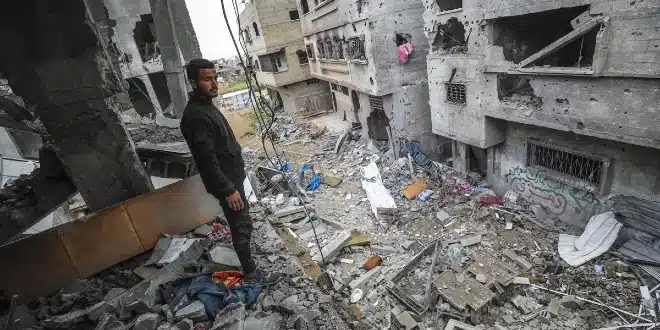On August 8, 2025, Israeli Prime Minister Benjamin Netanyahu doubled down on his strategy to intensify military operations in the Gaza Strip, aiming to dismantle Hamas’s control. He clarified that the goal is not to annex Gaza but to eliminate its threat to Israel by establishing a demilitarized zone led by a civilian administration unaffiliated with Hamas, the Palestinian Authority, or any terrorist group.
“We are not going to occupy Gaza — we are going to free Gaza from Hamas,” Netanyahu stated, emphasizing that this approach would secure the release of Israeli hostages and ensure long-term safety for Israel. Despite widespread criticism from international leaders and domestic voices, Netanyahu remains steadfast, framing the escalation as essential to achieving Israel’s objectives.
The plan, however, has drawn sharp rebuke for its potential consequences. Critics argue that the intensified offensive risks further endangering the lives of Israeli hostages held by Hamas while exacerbating the humanitarian crisis in Gaza. The strategy’s focus on military dominance over diplomatic solutions has fueled doubts about Netanyahu’s priorities, particularly as the conflict, now in its 305th day, continues without a clear vision for Gaza’s future.
Hamas Responds with Defiance and a Proposal
Hamas issued a stern warning on August 8, describing Israel’s occupation plan as a costly miscalculation that would fail to break Palestinian resistance. “Netanyahu’s plans and illusions will fail,” the group declared, asserting that its fighters and supporters remain unyielding. In a surprising move, Hamas expressed readiness to release all hostages in exchange for a complete cessation of hostilities and the withdrawal of Israeli forces from Gaza. Netanyahu’s lack of response to this offer, coupled with his reaffirmation of the military strategy on X, has led Hamas to question his commitment to prioritizing hostage safety, accusing him of pursuing personal and ideological agendas.
The militant group’s proposal highlights the ongoing stalemate, as both sides remain entrenched in their positions. Hamas’s call for a ceasefire underscores the potential for a diplomatic resolution, but the absence of engagement from Israel suggests a preference for military escalation over negotiation.
Opposition and Public Outcry Intensify
Israel’s opposition has fiercely criticized the government’s approach, labeling it a catastrophic misstep. Opposition Leader Yair Lapid condemned the plan as a “disaster” that contradicts the advice of military and security experts.
He accused National Security Minister Itamar Ben Gvir and Finance Minister Bezalel Smotrich of pushing Netanyahu toward a prolonged conflict that could result in significant loss of life, including hostages and soldiers, while draining billions from Israel’s economy. Lapid warned that the strategy risks trapping Israel in a purposeless occupation, aligning with Hamas’s goal of prolonging the conflict without a clear endgame.
Public discontent has also spilled onto the streets. On August 8, hundreds of Israelis protested outside Netanyahu’s office, demanding a focus on securing the hostages’ release rather than escalating the war. Internationally, over 100 UK-based Israelis and allies, organized by the activist group Mi-neged, demonstrated outside the UK Foreign Office, urging Prime Minister Keir Starmer to impose sanctions on Israel and push for an end to the conflict.
Political Motives and Humanitarian Toll
Speculation about Netanyahu’s motivations has grown, with some Israeli leaders suggesting that prolonging the war serves to maintain his coalition government, which relies on ultranationalist ministers who oppose any ceasefire.
This political calculus comes against the backdrop of a conflict that began with Hamas’s October 7, 2023, attack, which killed approximately 1,200 people and saw 251 taken hostage. Since then, Gaza’s health ministry reports over 61,000 Palestinian deaths due to Israel’s military operations, highlighting the staggering human cost.
The absence of a clear post-war plan for Gaza has intensified scrutiny of Netanyahu’s leadership. His insistence on military escalation, despite the mounting toll and lack of progress on hostage negotiations, raises questions about whether political survival is overshadowing strategic and humanitarian considerations.
Broader Implications for the Conflict
Netanyahu’s plan to reshape Gaza’s governance while neutralizing Hamas faces significant hurdles, both practical and ethical. The proposed demilitarization and establishment of a new civilian administration remain vague, with no clear framework for implementation.
Meanwhile, the humanitarian crisis in Gaza worsens, with civilians bearing the brunt of the ongoing violence. International pressure is mounting for a resolution that prioritizes hostage safety and addresses Gaza’s dire needs, but the path forward remains uncertain as diplomatic overtures stall.
As the conflict approaches its second year, the stakes for both Israel and Gaza are higher than ever. The coming weeks will test whether Netanyahu’s gamble on military escalation can deliver on its promises or if it will deepen the region’s cycle of violence and suffering.


